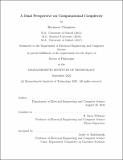A Dual Perspective on Computational Complexity
Author(s)
Chapman, Brynmor
DownloadThesis PDF (891.8Kb)
Advisor
Williams, R. Ryan
Terms of use
Metadata
Show full item recordAbstract
One central aim of theoretical computer science is to understand the limits of computation. On the one hand, algorithms give upper bounds on the resources required for a computation. They are intuitive, well-studied, and well-understood. On the other hand, proofs of hardness, or lower bounds as they are often called, seem to be elusive and relatively poorly understood. Perhaps the most famous conjectured lower bound is P ≠ NP, which informally states that there are problems whose solutions can be efficiently verified but not efficiently computed. P ≠ NP is so widely believed that the world economy relies critically on its truth. Indeed, complexity theorists generally believe the much stronger Exponential Time Hypothesis (ETH). However, despite decades of work, these conjectures remain open, as do much weaker conjectures such as P ≠ PSPACE.
The aforementioned discrepancy between what is known and what is believed is fairly representative of the state of the art in complexity theory, which invites the question: is it inherent? Are lower bounds somehow inherently harder to prove than upper bounds? There is a specific, provable sense in which the answer is yes. There are indeed proof barriers, which show that broad classes of proofs have no hope of proving many of the commonly studied lower bounds. These barriers have led to a fair amount of pessimism in complexity theory. The aim of this thesis is to study lower bounds from an algorithmic perspective, in order to use well-studied algorithmic techniques to advance complexity theory. It covers three facets of this perspective. It presents a way to bypass the Natural Proofs Barrier of Razborov and Rudich, discusses dualities between upper and lower bounds, and disproves longstanding conjectured lower bounds.
Date issued
2022-09Department
Massachusetts Institute of Technology. Department of Electrical Engineering and Computer SciencePublisher
Massachusetts Institute of Technology